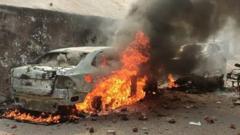Sambhal city in northern Uttar Pradesh is on high alert following violence that erupted on Sunday during a court-ordered survey of the Jama Masjid, a mosque dating back to the Mughal era. The unrest has claimed three lives and left many injured as tensions escalated between law enforcement and protestors opposing the survey, which was prompted by a recent petition asserting that the mosque sits on the site of a demolished temple.
The violence began after local authorities commenced a survey, leading to various clashes, including accusations from protesters that police opened fire. Authorities, however, have denied these claims, maintaining that no lethal weapons were used during the confrontations. Internet services in the affected areas were suspended, and schools were ordered to remain closed for safety reasons as authorities detained 21 individuals amid the turmoil.
Tension had been building since a local court mandated the survey after a petition claimed that the Jama Masjid was constructed after the historical temple of Hari Har was destroyed by Mughal emperor Babur in the 1520s. Protesters argue that they were not adequately notified about the survey, and they question the urgency with which it was ordered. On the day of the survey, demonstrators gathered near the mosque, prompting a violent response as they allegedly hurled stones at the police.
Top police officials reported that three individuals, identified as Naeem, Bilal, and Nauman, sustained fatal injuries during the clashes. The police responded with tear gas and plastic bullets to disperse the crowd, indicating the severity of the situation. Opposition leaders have criticized the state government, accusing it of instigating violence for political advantage—a claim the government refutes.
Mahmood Madani, the president of Jamiat Ulama-i-Hind, an influential Islamic scholarly organization, has condemned the ongoing disputes about mosque sites and called attention to their contradiction with Indian law. The unrest in Sambhal city reflects a larger trend of conflict surrounding religious sites in India, underscoring the fragile nature of intercommunal relations and the politicization of heritage claims in the country.






















